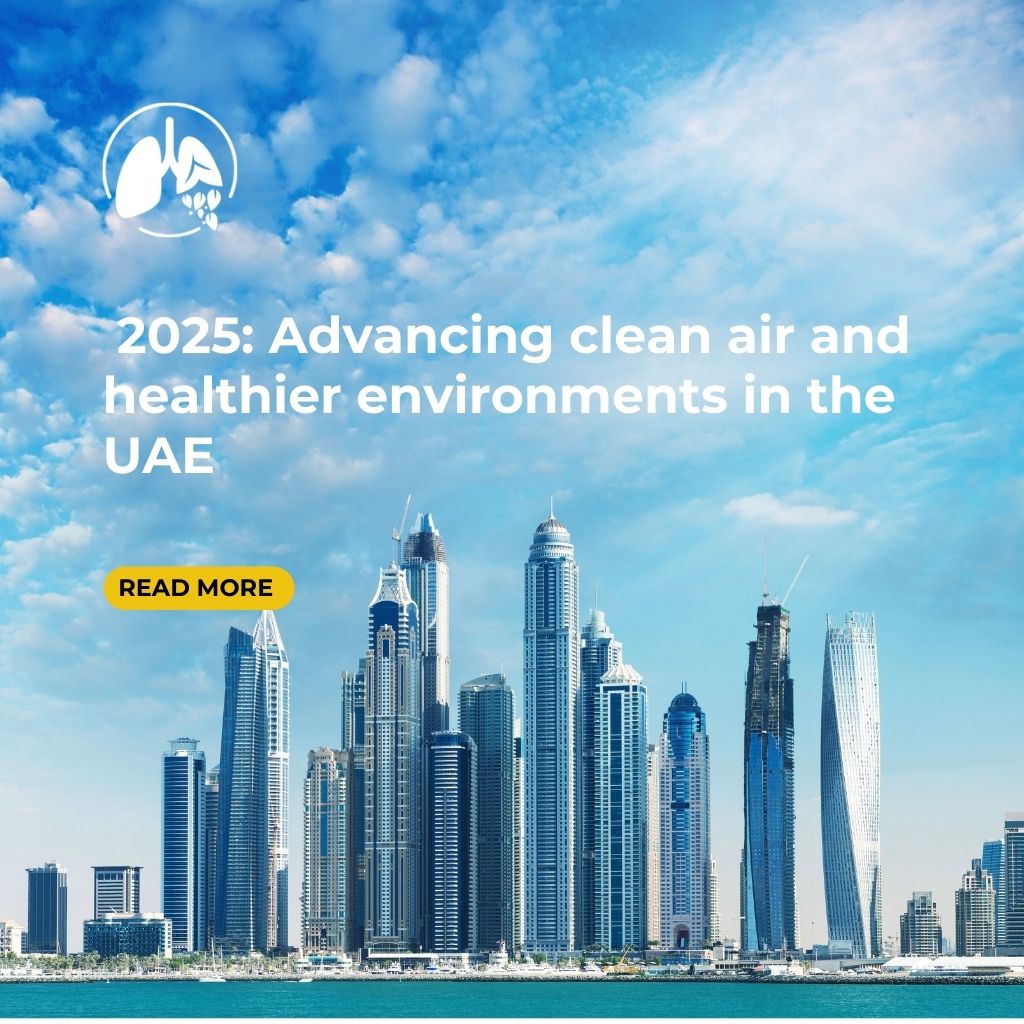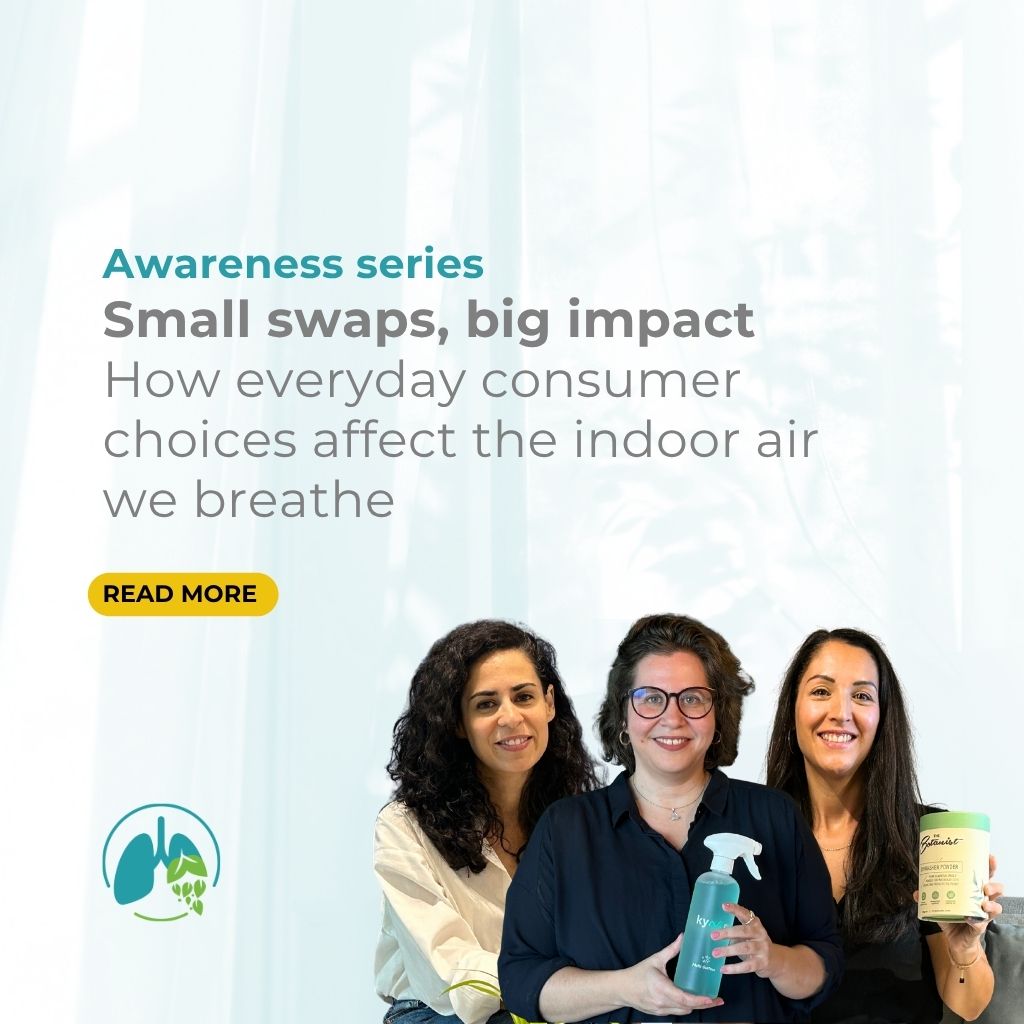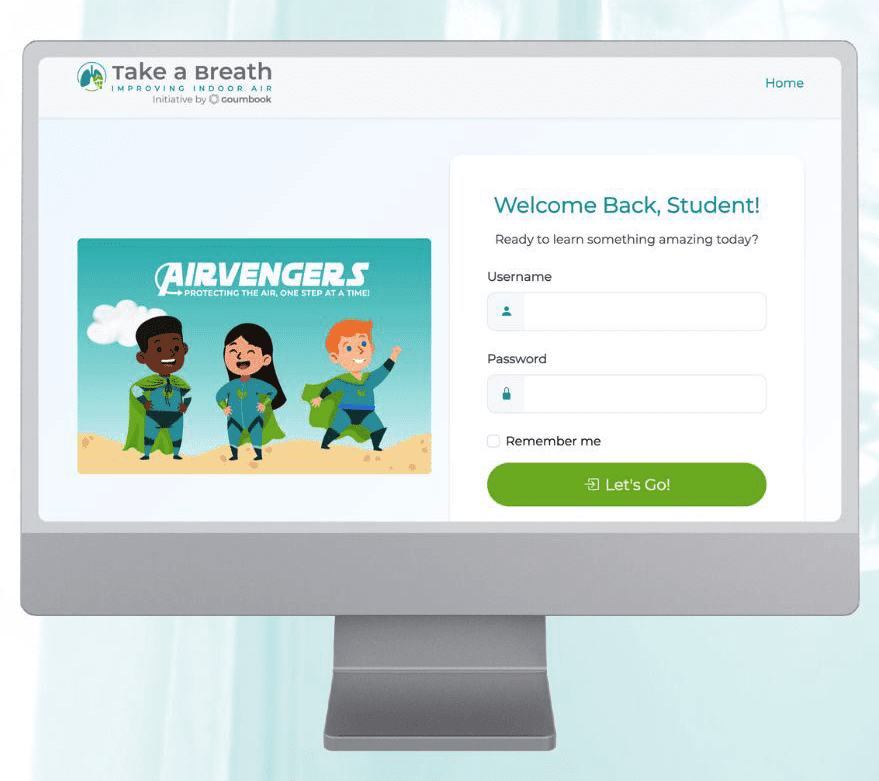
Take a Breath
is a UAE wide awareness and educational initiative drawing attention to the quality of indoor air and the importance of monitoring and improving it.
About the Campaign
TAKE A BREATH – Improving Indoor Air is an ongoing awareness campaign that raises attention to how indoor air quality affects our health and wellbeing.
It encourages people and organisations to monitor indoor air, helping them identify where pollutants come from and take practical steps to reduce allergens and improve the air we breathe.
Supported by our Take a Breath partners, the campaign aims to create cleaner, healthier indoor spaces across the UAE.
Who is this campaign for? This initiative is for everyone – from the public and private sectors to schools, universities, and communities. The goal is simple: to educate, raise awareness, and inspire collective action in homes, classrooms, workplaces, and public spaces throughout the country.
Online Learning Platform - Free For School Communities Across the UAE
The Take a Breath Online Learning Platform is a free, interactive resource designed for students in Years 4–6 / Grades 3–5 (ages 8–11).
It helps students discover the importance of indoor air quality through animated videos, interactive games, and hands-on activities that build awareness and inspire real action to improve air quality in their schools and homes. The platform also supports educators by providing ready-to-use content aligned with national science curriculums, helping teachers easily integrate air quality topics into classroom lessons.
With dedicated sections for students, teachers, school leaders, and parents, every group has access to tailored tools and resources that encourage learning, engagement, and collaboration across the entire school community.
In addition, school management and parents can connect directly with solution providers to explore practical ways to improve air quality in classrooms, households, and beyond.
👉 Discover the Take a Breath Interactive Learning Platformhere
School Study
As part of the Take a Breath initiative, an in-depth study was conducted in 10 UAE schools during the 2023–2024 academic year.
The study measured indoor air quality (IAQ) in classrooms before and after implementing targeted solutions, helping researchers develop practical guidelines to inform best practices for healthier learning environments.
Why Schools?
Focusing on youth and the spaces where they learn is vital to building resilience in current and future generations. Children are especially vulnerable to the long-term effects of indoor air pollutants because their bodies are still developing. According to the American Lung Association, children breathe 50% more air per half kilogram of body weight than adults, which makes them more susceptible to pollutants.
Prolonged exposure during childhood can lead to health problems later in life. Schools therefore have an ethical responsibility to provide a safe, healthy learning environment. Regularly monitoring and improving indoor air quality supports this duty and helps build long-term student wellbeing and resilience. Research from the Philips Foundation and the University of Manchester shows that reducing indoor air pollution by just 20% can improve working memory by 6%—equivalent to four extra weeks of learning per year.
Education and Impact
Schools play a key role in educating the next generation about environmental health. By testing indoor air quality and showcasing practical solutions, schools can teach students how to reduce pollution sources and adopt sustainable habits that improve the air we all share.
Our Studies
Corporate Study
Indoor Air Quality (IAQ) plays a crucial role in workplace health, wellbeing, and productivity – yet it often goes unnoticed in daily operations.
Poor indoor air can cause headaches, fatigue, respiratory issues, and reduced concentration, affecting both employee performance and overall organisational efficiency.
Research from the Harvard T.H. Chan School of Public Health shows that high pollutant levels inside buildings are directly linked to declines in cognitive function. In contrast, well-ventilated and cleaner workplaces can boost focus, decision-making, and overall productivity. The Take a Breath Corporate Study (2024–2025) aims to advance essential research on indoor air quality across UAE workplaces.
Its goal is to support the UAE National Air Quality Agenda 2031 by generating data-driven insights that shape healthier indoor environments and evidence-based workplace policies.
Participating organisations will contribute to a nationwide effort to better understand how indoor air quality impacts employee wellbeing and business outcomes.

Why Participate?





School Engagement
As part of the Take a Breath initiative, we offer a range of opportunities to educate students about the importance of indoor air quality (IAQ) and how they can improve it in their schools, homes, and communities.
Interactive Awareness Sessions
Our awareness sessions engage students in discussions that highlight the impact of IAQ on their health and learning environments. These sessions inspire students to understand the importance of clean air indoors and motivate them to take action to improve it.

Gamified Workshops
Through engaging, hands-on workshops designed for entire year groups, students explore IAQ solutions in a fun and interactive way. These workshops empower students to take practical steps toward improving air quality in their schools, homes, and local communities.
By participating in these activities, students become advocates for cleaner, healthier air, spreading awareness and inspiring action to improve it.

Did You Know?


Indoor air often contains a complex mixture of pollutants and environmental factors that can affect health and comfort.
These could include various allergens such as dust mites, mould spores and pet dander, but also:
- Particulate Matter (PM2.5) – fine particles with a diameter of 2.5 micrometers or smaller circulating in closed environments, coming from both indoor and outdoor combustion sources. Sources vary between human-related activities (e.g., vehicle emissions, industrial processes) and natural events (e.g., wildfires, dust storms). These particles can penetrate deep into the lungs, causing respiratory and cardiovascular issues.
- Carbon Dioxide (CO₂) – a natural gas exhaled by humans. Concentrations are high in poorly ventilated spaces with high occupancy, and elevated CO₂ levels can lead to drowsiness, decreased cognitive performance, and discomfort.
- Volatile Organic Compounds (VOCs) – gases emitted from certain solids or liquids. Sources vary between building materials (e.g., paints, varnishes, adhesives), furnishings, office equipment (e.g., printers, photocopiers) but also emitted from daily household products like all-purpose cleaners and even perfumes and air fresheners. Some examples of these airborne- Benzene, Formaldehyde, Toluene
Indoor air pollutants can cause damage to most organ systems in the body, not just our lungs and airways.
 Air pollution has been linked to cardiovascular deaths, stroke deaths and malignancies such as childhood leukemia and bladder cancer, in addition to diabetes mellitus prevalence, morbidity and mortality. Air pollution is also associated with reduced cognitive functions, delayed psychomotor development and lower intelligence. Moreso, there have been links made with It weakens immune systems and is associated with onsets of allergic rhinitis, allergic sensitization and autoimmunity. Physical effects can range from osteoporosis and bone fractures, conjunctivitis, dry eye disease, blepharitis, inflammatory bowel disease, increased intravascular coagulation, and decreased glomerular filtration rate. Indoor air pollution can be the cause for simple headaches to more complicated impacts such as infection with Legionella bacteria and carbon monoxide poisoning.
Air pollution has been linked to cardiovascular deaths, stroke deaths and malignancies such as childhood leukemia and bladder cancer, in addition to diabetes mellitus prevalence, morbidity and mortality. Air pollution is also associated with reduced cognitive functions, delayed psychomotor development and lower intelligence. Moreso, there have been links made with It weakens immune systems and is associated with onsets of allergic rhinitis, allergic sensitization and autoimmunity. Physical effects can range from osteoporosis and bone fractures, conjunctivitis, dry eye disease, blepharitis, inflammatory bowel disease, increased intravascular coagulation, and decreased glomerular filtration rate. Indoor air pollution can be the cause for simple headaches to more complicated impacts such as infection with Legionella bacteria and carbon monoxide poisoning.
Taking action to reduce our exposure to indoor air pollution – which is absolutely manageable – is an imperative!
The United Arab Emirates has made indoor air quality a national priority with ambitious targets to reduce air pollution and improve indoor air quality. UAE Vision 2021 aims to raise the air quality to 90 per cent in the UAE
The UAE National Air Quality Agenda 2031 was released in September 2022 to mark the International Day of Clean Air for Blue Skies, providing a framework for improving indoor air quality and reducing the risks to human health.
This framework seeks to:
- Establish effective policies and institutional frameworks.
- Enhance technical and human resource capacities.
- Promote scientific and academic research.
- Leverage advanced technology for better air quality management.

These commitments align with global efforts to combat air pollution, protect public health, enhance environmental sustainability, progress on net-zero emissions, adopt green building design and sustainable building standards in addition to implementing air quality monitoring among other technological innovations.

The footage of the series of sand and dust storms, heatwaves and wildfires over the summer in different parts of the world is a testament of the transboundary impacts of climate change, with dust, smoke, smog and particulate matter finding a way to seep into our indoor spaces causing a buildup of allergens and pollutants like carbon monoxide, nitrogen oxides and particulate matter, which can have adverse health effects.
These pollutants coming from outdoors can then be trapped indoors and get coupled with a higher concentration of indoor pollutants that result from indoor combustion sources like cooking for instance. To make matters worse, warmer temperatures as a result of global warming, can create favorable environments for mold to grow, leading to exacerbating allergies and intensifying other health conditions especially in poorly ventilated buildings. This complex relationship between climate change and indoor air pollution requires collective action to both mitigate its impact but also adapt to its consequences.
Addressing the interconnected natures of this global challenge provides a range of opportunities for improvement by encouraging the adoption of cleaner energy sources and better building practices.
For more information on the link between climate change and indoor air pollution, click here to listen to this relevant podcast.







Team Building: Creating Healthier Workspaces Together
As part of the Take a Breath initiative, we offer interactive corporate team-building experiences that raise awareness about indoor air quality and show teams how small actions can make a big difference.
These sessions centre around plants – nature’s own air purifiers – which are proven to capture indoor pollutants and reduce symptoms of sick building syndrome. Incorporating greenery helps create healthier, more productive workplaces.
During this hands-on activity, participants learn about the hidden challenges of indoor air pollution and build their own natural air purifiers in the form of terrariums. It’s a fun, creative way to combine learning with action while encouraging environmental responsibility.
Build One, Share One: For every terrarium made, a second is donated to local foundations and charities, giving the gift of cleaner air to those in need and extending the impact beyond the workplace.



This meaningful activity promotes environmental and health awareness while fostering teamwork and community impact. It’s an opportunity for employees to engage with a critical issue while contributing to their own well-being and the broader community.
Knowledge Partners





Advisory Board

Deepthy K B
Regional Director, Market Development
GBCI Middle East

Dr Diana Francis
Assistant Professor, Earth Sciences
ENGEOS Labs, Khalifa University

Dima Al Srouri
Founder
Biospheric City Lab

Faizal Hasham
General Manager
AQM

Heba Safi
Technical Officer on Air Quality and Health, World Health Organization
Regional Centre for Environmental Health Activities, Amman, Jordan

Dr. Iyad Al-Attar
Visiting Academic Fellow
Cranfield University

Jie Zhao
WELL Faculty, Head of Delos Labs, Executive Vice President
Delos

Majd Fayyad
DSM Strategy & Policy Lead & Director & Board Member Advancing Net Zero Volunteering Team
Dubai Supreme Council of Energy

Mónica Ubalde López
Research Scientist at the Climate, Air Pollution, Nature and Urban Health Program, Barcelona Institute for Global Health
ISGlobal

Oriol Teixido
WHO Advisor & Associate Director, Air Quality and Climate Change
Ricardo

Dr Srikanth Sola
CEO & Co-Founder
Devic Earth

Dr Safeena Kherani
Paediatric Otolaryngology-Head & Neck Surgery Consultant
Al Jalila Children's Hospital

Tatiana Antonelli Abella
Founder & Managing Director
Goumbook
For more information about Take a Breath
In the Press
Knowledge Hub

2025: Advancing Clean Air and Healthier Environments in the UAE
Clean air is not only an environmental goal — it is a foundation for health,...

Goumbook x Takween Al Ghurair: 2025 Sustainability Education Milestones
At Goumbook, we believe education is a powerful driver of sustainable change. In 2025, this...

Small Swaps, Big Impact: How Everyday Consumer Choices Affect the Indoor Air We Breathe
The Power of Everyday Products We often think about air pollution as something outside —...


